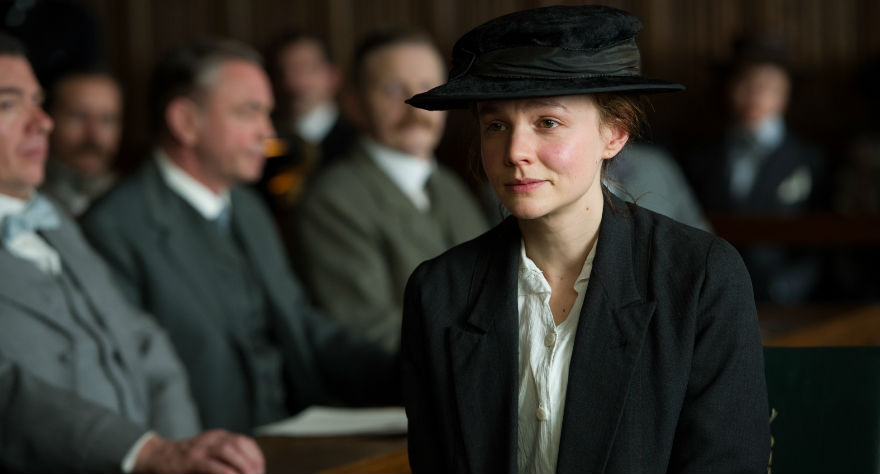
A modest, respectful film chronicling the dark days of the early suffragist movement.

A modest, respectful film chronicling the dark days of the early suffragist movement.
It’s a great relief that Suffragette isn’t a showy, glamorized, romantic period piece meant to wow us with its pretty locales and intricate costume design. The British suffragettes of the early 20th century deserve a more honest, grounded depiction than that, and that’s what director Sarah Gavron and writer Abi Morgan deliver. Their version of the suffragette movement is violent, thrilling and dirty. These women put everything on the line in the name of justice and equality, shattering windows and blowing up mailboxes at the risk of losing their jobs and families. Women may have won the right to vote here and in Britain a long time ago, but the tragedy is that many of the injustices the suffragettes rallied against in the past still stand strong today.
We see the movement through the eyes of Maud (Carey Mulligan), a working woman with a husband, Sonny (Ben Wishaw), and a son, George (Adam Michael Dodd). Maud’s not taken from the history books—she’s a composite of Morgan and Gavron’s research on suffragettes of the time, particularly those in the middle class. At the story’s outset she exists outside the suffragette circle, accepting of her lot working at a musty laundry where she’s sexually abused by her boss. Her inner activist is ignited when she sees suffragettes carrying out minor acts of vandalism all around East London in their fight for equal voting rights.
Almost by accident, Maud is recruited by her co-worker Violet (Anne-Marie Duff) and is further inspired by Edith Ellyn (Helena Bonham Carter), a suffragist leader who holds secret meetings in the pharmacy she runs. Leading the larger suffragist charge as figurehead is Emmeline Pankhurst (Meryl Streep), who gives Maud a jumpstart of empowerment and inspiration (we see her only briefly, but Streep knows how to make her minutes count). The women may not have a voice in parliament, but they’ve got bravery and conviction to spare.
As she gets caught up in suffragist activities, Maud begins to realize the true scale of her sacrifice for the movement. She’s thrown in jail (where she’s force-fed—a gruesome scene) and villainized by most of her community, and Sonny hasn’t the patience or understanding to tolerate her new life’s mission. He kicks her out of their tiny flat and forbids her from seeing George, leaving her fellow female foot soldiers as her only allies.
Mulligan has a gift that allows her to embody strength and delicateness at the same time, and few roles would be better served by her talents than that of Maud. Heartrending are the scenes in which Maud sneaks George away from school to spend a few precious hours of quality time; you can see joy and anguish in equal parts on Mulligan’s face as Maud savors her time with her son. Also great are Mulligan’s scenes with Brendan Gleeson, who plays a detectie heading up a suffragette surveillance operation. He’s the only almost-sympathetic figure on the oppressor’s side of the story (he empathizes with the suffragettes but ultimately does nothing to help them), though the film never ham-fistedly villainizes the men in the story. Other filmmakers might have made the story about some sort of ethical awakening on the men’s side, but Gavron and Morgan are more tasteful than that; their story is about the women’s fight for justice, period.
There’s no effort to show off the film’s elaborate production design in a Hollywood-y way by Gavron, and that’s one of the film’s strengths. Every bit of East London we see looks detailed and painstakingly designed, but the characters are always the focus, which results in a more immersive period experience. This is the first movie ever to be allowed to film at the UK’s Houses of Parliament, and the filmmakers don’t squandor the opportunity by giving the location center stage. It’s the sign of a film made with dignity and care.
The thing working against Suffragette is that it’s not quite as rousing as you’d think it would be. It’s admirable in the way it respects the dark days these heroes endured to pave the way for future generations, but there’s something about the tone and pace of the movie that lacks an overarching sense of force and activist aggression, something a movie so unenamored with style could have done better with. On the other hand, I’ll take a melancholic but respectful historical drama over a glitzy, Oscar-bait-y one any day.